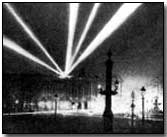On This Day - 11 November 1918
 Theatre definitions:
Western Front comprises the Franco-German-Belgian front and any
military action in Great Britain, Switzerland, Scandinavia and Holland.
Eastern Front comprises the German-Russian, Austro-Russian and
Austro-Romanian fronts. Southern Front comprises the
Austro-Italian and Balkan (including Bulgaro-Romanian) fronts, and
Dardanelles. Asiatic and Egyptian Theatres comprises
Egypt, Tripoli, the Sudan, Asia Minor (including Transcaucasia), Arabia,
Mesopotamia, Syria, Persia, Afghanistan, Turkestan, China, India, etc.
Naval and Overseas Operations comprises operations on the seas
(except where carried out in combination with troops on land) and in
Colonial and Overseas theatres, America, etc. Political, etc.
comprises political and internal events in all countries, including Notes,
speeches, diplomatic, financial, economic and domestic matters.
Source: Chronology of the War (1914-18, London; copyright expired)
Theatre definitions:
Western Front comprises the Franco-German-Belgian front and any
military action in Great Britain, Switzerland, Scandinavia and Holland.
Eastern Front comprises the German-Russian, Austro-Russian and
Austro-Romanian fronts. Southern Front comprises the
Austro-Italian and Balkan (including Bulgaro-Romanian) fronts, and
Dardanelles. Asiatic and Egyptian Theatres comprises
Egypt, Tripoli, the Sudan, Asia Minor (including Transcaucasia), Arabia,
Mesopotamia, Syria, Persia, Afghanistan, Turkestan, China, India, etc.
Naval and Overseas Operations comprises operations on the seas
(except where carried out in combination with troops on land) and in
Colonial and Overseas theatres, America, etc. Political, etc.
comprises political and internal events in all countries, including Notes,
speeches, diplomatic, financial, economic and domestic matters.
Source: Chronology of the War (1914-18, London; copyright expired)
Western Front
British capture Mons before dawn.
Armistice signed at 5 am. Hostilities on all fronts cease at 11 am.
End of the Battle of the Sambre.
British front extends about 60 miles from near Montbliart (east of Avesnes) to just north of Grammont; held from south to north by Fourth, First, Fifth and Second Armies. Positions unchanged until 17 November.
Eastern Front
British recognise Lettish Government as independent.
New National Government in Estonia orders general mobilisation.
Polish Directorate established at Warsaw; Regency Council deposed.
Political, etc.
Appeal of Dr. Solf, German Foreign Minister, to President Wilson for mitigation of armistice terms.
Abdication of Grand Dukes of Hesse, Mecklenburg and Saxe-Weimar. King of Saxony and Grand Duke of Oldenburg dethroned.
German Socialist Coalition Ministry formed.
Message of King George to British Empire.
Great rejoicings in England.
Speech of President Wilson at Washington.
Expulsion of Bolshevist Mission from Switzerland.
